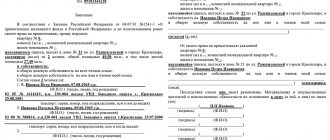What means?
Apartment privatization – what is it? Privatization of an apartment is the process of transferring state property into private hands .
Typically, such a transfer is used to generate additional revenue for the budget or to get rid of problematic property complexes. Housing privatization has completely different goals.
Russia is following the market path of development. It is necessary to transfer the work of housing and communal services to these rails.
Pay attention to modern apartment buildings: homeowners, united in partnerships, enter into contract agreements for the provision of utilities and maintenance of their houses.
In this case, state governing bodies perform an exclusively supervisory function . State residential premises in which people live under a social tenancy agreement do not fit into this scheme at all And today such apartments still make up about 14% of the total housing stock.
What does privatization of an apartment give, why is it necessary for a specific person? After it, the tenant of the apartment gets the opportunity to do whatever he wants with his, now, real estate: sell, exchange, bequeath or donate. Now the tenant has his own housing , and he received it completely free of charge .
However, there are also pitfalls in this process. Therefore, in the next section we will discuss whether it is worth privatizing an apartment in Khrushchev.
What is housing privatization
Privatization should be understood as the transfer of housing from municipal property to the ownership of the tenant, who as a result becomes the owner of this housing.
After privatization is completed, the citizen receives a certificate of registration of ownership.
Only after this the owner will have the right to own and dispose of the apartment. An apartment can be privatized either for one person or for several persons, provided that they do not already have another privatized apartment.
pros
If a citizen lives under social rent, he is limited in his actions regarding the disposal of this housing. This means that in the event of non-payment of utilities or as a result of the death of the tenant with whom he lives, the apartment is transferred to the municipal authorities.
With privatization, on the contrary, you have full right to dispose of the apartment - you can exchange or sell it. And this can be considered a plus of this process.
If you have privatized an apartment, you can be sure that they will not be able to evict you from it, even for debts.
Another advantage of this process is the ability to check in and out of the apartment:
- family members;
- other persons at its discretion.
Minuses
Looking through the assessments of realtors, it must be said that the percentage of citizens who have not privatized apartments is becoming smaller. However, some disadvantages of this process may make the remaining percentage of people wonder whether they really need all this.
This is important to know: Is it possible to be registered in two apartments?
Among the above advantages, privatization also has the following disadvantages:
- If you live in a communal apartment, it is not particularly profitable to privatize it. In this case, it is better to get the local government to improve living conditions than to later sell this privatized apartment.
- Another disadvantage is the increase in the cost of payments, which includes property tax, fees for the maintenance and repair of common property. In this case, having privatized such an apartment, it will be a burden to you, this applies to lonely old people. Why pay tax? If they have no relatives, and the apartment will still go to the state after their death.
Can a wife be registered with her husband in a privatized apartment without consent? See here.
Privatization of an apartment: pros and cons
Let's try to weigh all the pros and cons of privatizing an apartment. Let's start with the negative points :
- The first thing you need to pay attention to is difference in payment privatized and non-privatized apartments.
Utility bills are always paid by residents. The owner also bears the responsibility maintenance costs in good condition common property apartment building: attics, basements, elevator equipment, locking devices.If housing belongs to the state , then residents do not need to worry about this. The situation is completely different with people who have privatized their apartments.
The simplest example is the installation and replacement of water and electricity meters. The tenant of the premises will receive these devices free of charge , and will not maintain them at his own expense.
- Deserves special mention major renovation. Houses deteriorate over the years, communications require replacement, and this costs a lot of money.
From 2020 owners of private housing stock have joined in financing future major repairs in the houses where their residential premises are located.In Moscow , for example, for each meter 15 rubles for future major repairs . For poor citizens, pensioners and disabled people, the amount can be significant.
- Don't forget about real estate tax , which depends on the cost of the apartment. After you become the owner of the property, this payment will be added to the list of expenses.
- When demolishing dilapidated housing, the owner of the apartment will be provided with housing of equal area . If a family occupies premises under a social tenancy agreement, then a new apartment will be provided taking into account sufficient space for one person .
In other words, this is a very real chance to improve your housing situation completely free of charge , available only if you use housing under a social rental agreement.
Now let’s pay attention to the advantages of apartment privatization:
- free disposal of the apartment . You can rent out your property, sell it, exchange a privatized apartment, donate it, and, in the end, legally bequeath it to whomever you want;
- It is extremely difficult to evict a person from your own home. Try not to pay utility bills in a municipal apartment for six months - you will get an unambiguous hint that you will soon move to the outskirts of the city or to a hostel;
The owner will face a trial and, in the future, an exchange for housing of a smaller area so that the difference will cover the debts to utility services.This happens extremely rarely, because the courts can drag on for years due to numerous delays and appeals of decisions.
As a result, the owner will have time to resolve all financial difficulties and pay off debts.
Or, as a last resort, take out a loan from the bank , for which the same apartment can act as collateral.
- Owning an apartment is insurance against changes in government policy.
As you can see, a privatized apartment has pros and cons ; decide for yourself whether you need it or not.
Privatized and non-privatized housing - advantages and disadvantages
VIDEO ON THE TOPIC: Inheritance of a non-privatized apartment
According to the Federal Law of the Russian Federation from Despite the deadlines that are running out, there are still those among the residents who are considering the issue of privatizing their apartment. Within the framework of this material, we will try to understand the pros and cons of privatization and give the opportunity to think about whether it is worth leaving the apartment non-privatized at all?
Privatization is the voluntary transfer of municipal residential premises into the ownership of a public housing tenant. After the privatization of the apartment is completed, a certificate of registration of ownership will serve as proof of ownership of the occupied residential premises.
This is important to know: Apartment privatization agreement: where to get a duplicate
From the moment the apartment is privatized, the owner has the right, along with the rights of ownership and use, to dispose of the apartment. Housing can be privatized once, either for one or for several persons who have not previously participated in privatization, including minors. Living in a municipal apartment, the tenant is completely limited in the right to dispose of housing.
The apartment is state property, which means that for non-payment of utility bills, or as a result of the death of the responsible and only tenant included in the order, the housing will be transferred to the landlord, i.e.
By entering into ownership of housing, this is perhaps the main plus in the direction of privatization of housing. It is almost impossible to evict from a privatized apartment; we are talking about eviction for debts. Irresponsible payers or persons who for some reason do not pay utility bills cannot be forcibly evicted by law. The law provides for the repayment of debts at the expense of the seized property, the remainder of which is returned to the owner of the apartment.
If the debtor lives in a municipal apartment and does not pay for utilities, the law establishes a procedure for eviction of a persistent defaulter into a residential premises that meets the general standards of a dormitory of 6 square meters.
Along with this, the owner of a privatized apartment has every right to sign in and out of anyone at his own discretion. The opportunity arises; we are not currently considering exceptional cases of evicting your ex-spouse, who lived in the apartment before the divorce. A privatized apartment, unlike a non-privatized one, can be bequeathed or inherited in accordance with the legislation of the Russian Federation.
In case of receiving a loan, a citizen has the right to pledge a privatized apartment to secure the obligations given to the bank. And finally, redevelopment can be carried out in a privatized apartment, which is sometimes almost the only way to improve living conditions. According to realtors and official representatives, there are fewer and fewer citizens who have not yet privatized their homes. However, some negative aspects that will follow privatization may puzzle the remaining percentage of those on the fence.
And in general, it is not without reason that among the significant advantages of privatization there are also disadvantages. For example, it is unprofitable to privatize housing in the event of an emergency condition of a residential building. The fact is that when resettling a dilapidated house, the legislation provides for norms according to which each registered family member living in a dilapidated house, or a family requiring improved living conditions, is entitled to 18 square meters. If a family lives in a communal apartment, it is not at all profitable for them to privatize their home.
Practice shows that obtaining rights from the municipality to improve living space is much easier than selling a communal apartment or a dorm room in the case of a privatized apartment. The next disadvantage of a privatized apartment is the increase in payments, which include payment of annual property tax and fees for the maintenance and repair of common property.
Thus, a privatized apartment can be considered a burden for lonely elderly citizens who can only rely on their own strength. They have no need to pay property tax, because soon this same property will be transferred to the state. And finally, the privatized apartment is inherited by law by all heirs in the event that there is no will.
Therefore, if you want to see a certain person as the owner of your apartment, you should take care and draw up a will, which is a rather troublesome process. It turns out that not all residential premises can be privatized. For example, square meters located in a dilapidated building, dormitories or office premises are not subject to privatization.
Exceptions are made for office premises related to the housing stock of state farms and enterprises in rural areas, equated to their housing stock. Along with these rules, there are others, according to which premises included in the reconstruction or modernization plan can be privatized.
What will happen if you don’t privatize the apartment? According to experts and lawyers, the danger of losing a municipal apartment in the event of non-privatization during the given period is minimal. This category of residents will have the status of tenants with the obligation to pay for the rental of residential premises in accordance with the tariffs established by the municipality. Alena Narignani, Alesya Dovlatova Housing and communal services. The whole truth about how we are being deceived.
All news State real estate: what is it? How is it different from municipal and privatized? Today we will talk about an interesting phenomenon - state real estate in Russia. What applies to state real estate? How is it related to state functions of maintaining cadastral records and registering rights to real estate? How is the sale and rental of state real estate carried out?
What is the difference?
The reasoning of those people who ask: why privatize an apartment shows their orientation towards the care of the state. They say that their houses will be repaired at the expense of the budget, their living conditions will be improved, and there is no point in transferring the occupied premises into ownership.
But who can guarantee that this will always be the case? Now the fee for using a non-privatized apartment under a social tenancy agreement is several hundred rubles .
But it may well grow if there is no longer enough money in the municipal budget. The owner of the home, represented by local authorities, will say that the residents use the property, but underpay for their accommodation.
For now, this is just a negative scenario for possible developments. But real estate is an investment for the long term. And in such a time, a lot can change in state policy. This is not the only difference between a privatized apartment and a non-privatized one.
The older generation still remembers how all apartments were state-owned and given out free of charge, but now it’s hard to even imagine.
You must decide for yourself whether to privatize the apartment or not.
Is shared ownership beneficial?
It is also worth knowing: what is shared privatization of an apartment, the pros and cons of such a process.
A problematic issue is the general privatization of an apartment, the residents of which do not have a unanimous opinion regarding the future owner of the property.
For example, children cannot decide the fate of the living space inherited from their parents where they are registered.
The apartment is a single property complex .
And it is impossible to privatize it piecemeal . As a result, the housing will be in shared ownership of all family members who were registered in it.
Of course, it will be possible to divide the apartment into parts , assigning, if possible, certain rooms to each of the owners. But in such a situation, privatization loses its main advantages.
Other owners will not allow you to dispose of the entire property, and it will be very difficult to sell one room . People are simply not ready to pay a lot of money for real estate and live, in fact, in a communal apartment, which the state has been trying to get rid of for so many decades.
Owning part of a residential property will not provide, in fact, any advantages for the owners, except for increased, albeit slightly, costs.
In this case, it is best to wait . One of the relatives may move, get discharged, or buy their own home. Children may appear in the family, which will make it possible to apply for a larger apartment .
If you have not yet managed to register ownership of your home, then read how to privatize an apartment under a social tenancy agreement. Find out here who should change the battery, electric meter and balcony in a privatized apartment.
6 ways to find out whether an apartment is privatized or not are described at the link.
Is it necessary to register land ownership?
Common shared and common joint property have the same nature: they both imply a plurality of owners of the same property.
Only through privatization can a citizen legally become the full owner of a house or apartment. And no one will constrain him in his ability to manage his own housing. What conclusion can be drawn from such a difficult situation to resolve?
Volume. Registration of ownership is a broader concept than privatization, which includes, among other things, the purchase of real estate, its acceptance as a gift and inheritance, barter, and more.
Obtaining ownership rights is a very significant plus in the direction of housing privatization. If you have accumulated huge debts for utilities, then it is almost impossible to evict you from a privatized apartment, which cannot be said about a non-privatized apartment.
This is important to know: Refusal of privatization in favor of another person
Do families with many children need to register housing as their property?
Next you will find out: what is a privatized apartment, what does this process mean for large families? And why is it not beneficial for such citizens?
Another case when people should postpone privatization is when a large family is living in a state apartment.
Such families, as is known, are under special tutelage of the state , and very rarely have free funds.
Is it profitable to privatize an apartment for a large family? No, an increase in the cost of living for parents with many children can be a serious blow to the budget .
In addition, you can always claim to improve your living conditions by obtaining a new state apartment to replace the old one, where the number of square meters per person no longer meets the standards.









